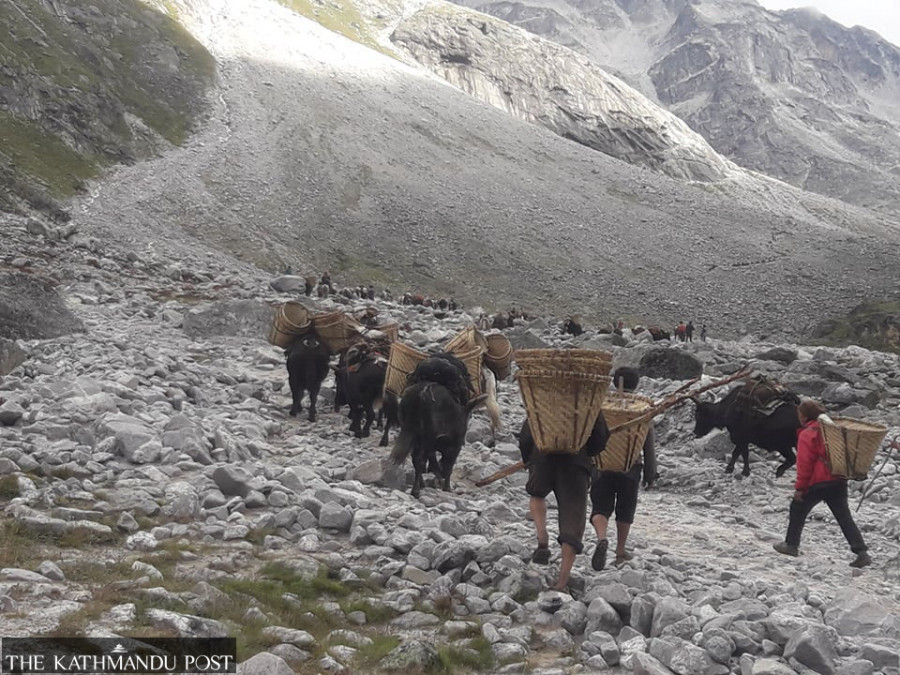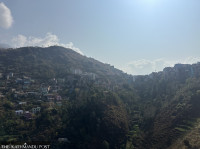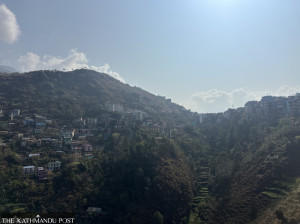Karnali Province
Buying salt becoming a challenge for outlying Mugu villages
Locals have to make an arduous, costly two-day journey to Gamgadhi to buy subsidised salt.
Raj Bahadur Shahi
It is a challenge for Phunjong Tamang, a resident of Mugum Karmarong Rural Municipality-2, to provide for his family of five given his poor financial condition. The unavailability of salt locally has further added to his challenge, he says.
“The price of salt is higher than that of food grain,” Tamang said. “We can at least grow crops in our own fields, but we can’t produce salt. The unavailability of salt has been a generational struggle for the locals of Mugum Karmarong.”
Until five years ago, Tamang, like many others from his village, travelled to Tibet to purchase salt. But ever since the borders closed due to the Covid pandemic, he has been forced to walk for two days to reach Gamgadhi, the district headquarters to procure salt.
The Mugu (Nagcha) border point has remained closed since 2020 when the Covid pandemic broke out.
Although salt depots have been established in Soru and Khatyad rural municipalities outside of the district headquarters, a salt depot is yet to be established in Mugum Karmarong. This has compelled the locals of Chitai, Dolphu, Karti, Kimri and other villages in the rural municipality to travel to the district headquarters for salt.
Salt is among rationed food items in the district. The Gamgadhi-based branch of the Salt Trading Corporation sells five kgs of non-iodised salt per person per month. “We have to travel for two days to reach Gamgadhi. Then we have to wait in a queue for an entire day to purchase five kgs of salt,” said Torcha Tamang, a local resident of Chitai village. “The entire journey to and from the village and a day’s wait at the depot takes us five days.”
So including the cost of travel, food and accommodation, each local pays around Rs5,000 to get five kilos of salt, which is sold at a subsidised price of Rs9 per kilo, says Torcha.
Torcha says the authorities concerned have not prioritised the villages in Mugum Karmarong to set up a salt depot. “There are salt depots in other villages so the locals don’t have to travel to Gamgadhi, but our rural municipality does not have one and we are suffering as a result,” said Torcha. “We either have to eat unsalted food or spend money to go to Gamgadhi to buy salt. There are no other options.”
According to Phutuk Tamang, salt shortage has been a long-standing issue in their village. Phutuk, a local resident of the Dolphu village, shares that before the pandemic, some 56 locals would embark on a journey with their horses and mules to Tibet during May-June to buy salt. However, the border closure has deprived them of that option.
Chitai, a dense village of 66 families, is no stranger to salt shortage. Even though food essentials such as rice, lentils, ghee, cooking oil, tea leaves, and others are readily available in the village, Chitai locals too have to take the arduous journey to the district headquarters for salt, says Tsering Tamang, a village local. “We are forced to buy crystal salt at Rs75 per kg from sellers, who bring back salt from Gamgadhi.”
Tsering shares that they have to rely on one of the two options—either buy the salt from the sellers at an extremely high price or travel to the headquarters to buy the subsidised salt distributed by the corporation.
Mugum Karmarong Rural Municipality has a total population of 1,200 people.
Mugu, Chitai, Karti, Kimri, Wangri and 12 other villages share their border with the Chinese autonomous region of Tibet.
The lack of a salt depot in Mugum Karmarong has hugely inconvenienced the locals, said Mugum Karmarong Rural Municipality chairman Tsering Kyapne Lama. “The border has been closed for so long and the locals have no option but to travel to the headquarters for salt,” he said.
According to Kyapne Lama, repeated requests for the establishment of a salt depot in the rural municipality have been made to various authorities, but to no avail.
However, Salt Trading Corporation Branch head Devendra Kumar Mahato claims that the discussion about the establishment of a salt depot at the rural municipality is in progress.
Out of the yearly quota of 3,200 quintals of salt that has been set for the district, 1,200 quintals are distributed between Chhayanath Rara Municipality and Mugum Karmaron Rural Municipality every year, Mahato added.
“While the yearly quota in itself is insufficient, the untimely and delayed salt production by the contractors adds to the burden of the consumers.”




 16.58°C Kathmandu
16.58°C Kathmandu.jpg)












